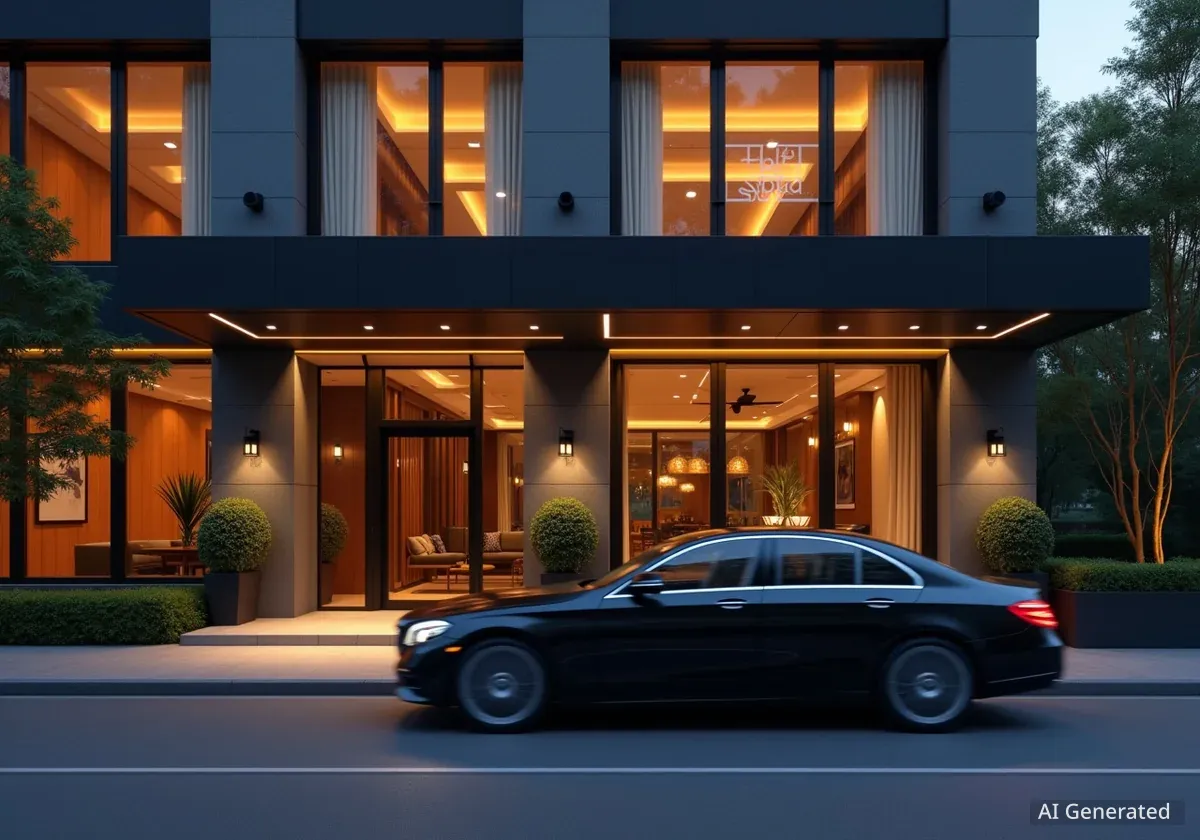The Duke Street Boutique Hotel in Liverpool has been acquired by the Golding Group following a competitive sales process that attracted nine separate offers. The 30-room hotel, located near the city's vibrant Chinatown, is set to reopen in the coming weeks under its new ownership, adding to Golding Group's growing portfolio of hospitality venues in the city centre.
The property was brought to market at the beginning of 2025 by business property adviser Christie & Co, acting on behalf of joint administrators. While the final sale price remains undisclosed, the freehold for the modern, purpose-built hotel was initially listed with an asking price of £2.25 million.
Key Takeaways
- New Ownership: The Duke Street Boutique Hotel has been sold to the Golding Group.
- High Demand: The sale process, managed by Christie & Co, generated significant interest, resulting in nine offers.
- Property Details: The hotel features 30 en-suite rooms, a modern design, and is located near Liverpool's Chinatown.
- Reopening Plans: The new owners intend to reopen the hotel to guests in the coming weeks.
- Market Strength: The sale highlights strong investor confidence in Liverpool's city-centre hospitality market.
Details of the Acquisition
The sale of The Duke Street Boutique Hotel marks a significant transaction in Liverpool's hospitality sector. The property was officially sold to the Golding Group, a company that already maintains a presence in the city's central hospitality market. The acquisition was managed by Christie & Co, who were instructed by joint administrators to handle the sale early in 2025.
In a statement regarding the purchase, the Golding Group expressed enthusiasm for the new addition to their assets.
"We are very excited to add the Duke Street Boutique Hotel to our existing hospitality portfolio in central Liverpool, and we look forward to welcoming guests in the coming weeks.”
The hotel's freehold was marketed with an asking price of £2,250,000. Although the final purchase price has not been made public, the competitive nature of the bidding process suggests strong market valuation for properties of this type and location.
Background of the Property
The Duke Street Boutique Hotel is a modern, purpose-built establishment that previously operated on a limited-service model. This model, which focuses on providing core accommodation services without full-service amenities like on-site restaurants, is increasingly popular in urban tourism markets.
A Highly Competitive Sales Process
The sale of the hotel was notable for the high level of interest it generated from potential buyers. According to Christie & Co, the marketing campaign resulted in a total of nine formal offers being submitted for the property. This underscores the current strength and appeal of Liverpool's hotel market, particularly for well-located, limited-service venues.
Tom O’Malley, Associate Director at Christie & Co who managed the sale, commented on the market conditions.
"The market for limited-service hotels in city centres is as hot as it has ever been. We ran a swift process for our clients, which culminated in receiving nine offers."
O'Malley added, "It was a pleasure to act in this transaction and deal with both parties. We wish the new owner every success with their new venture.” The rapid and competitive process highlights investor confidence in the city's ability to attract tourists and business travellers.
Profile of The Duke Street Boutique Hotel
The Duke Street Boutique Hotel is a modern property designed to cater to the contemporary traveller. Its strategic location near Liverpool's historic Chinatown places it within easy reach of many of the city's key attractions, including the Baltic Triangle, Liverpool ONE, and the Albert Dock.
Hotel Features at a Glance
- Total Rooms: 30 en-suite letting rooms.
- Special Feature: Three ground-floor rooms have direct access to a private courtyard area.
- Construction: The building is of modern construction, offering contemporary facilities.
- Service Model: Previously operated as a limited-service hotel, focusing on accommodation.
The hotel's 30 rooms are all equipped with en-suite facilities. The inclusion of courtyard access for select rooms provides a unique selling point, offering guests a private outdoor space in the heart of the city. This feature is particularly attractive in a post-pandemic travel market where guests may value personal space and open-air amenities.
The limited-service model allows for more efficient operations and competitive pricing, which appeals to a broad range of visitors, from tourists to corporate clients seeking a comfortable and convenient base in the city.
Liverpool's Thriving Hospitality Market
The successful sale of The Duke Street Boutique Hotel is indicative of a broader trend in Liverpool's commercial property market. The city continues to be a major UK tourist destination, drawing visitors for its cultural heritage, music scene, sporting events, and vibrant nightlife. This sustained demand for accommodation fuels investor interest in hotel assets.
Several factors contribute to the market's strength:
- Growing Tourism: Liverpool's visitor economy has shown remarkable resilience and growth, consistently attracting both domestic and international tourists.
- Demand for Boutique Hotels: Travellers are increasingly seeking unique, characterful accommodation over larger, chain hotels. Boutique establishments like the one on Duke Street offer a more personalised experience.
- Strategic Urban Locations: Properties in central, walkable locations like Duke Street are highly prized. Proximity to transport links, attractions, and dining options is a key driver of value.
- Efficient Operating Models: The limited-service hotel model has proven to be financially robust, with lower overheads and staffing requirements compared to full-service hotels, making them an attractive investment.
The intense competition for this property, with nine bidders vying for ownership, confirms that investors see long-term potential and stability in Liverpool's hospitality sector. The swift reopening planned by the Golding Group suggests they are keen to capitalise on this demand immediately.





